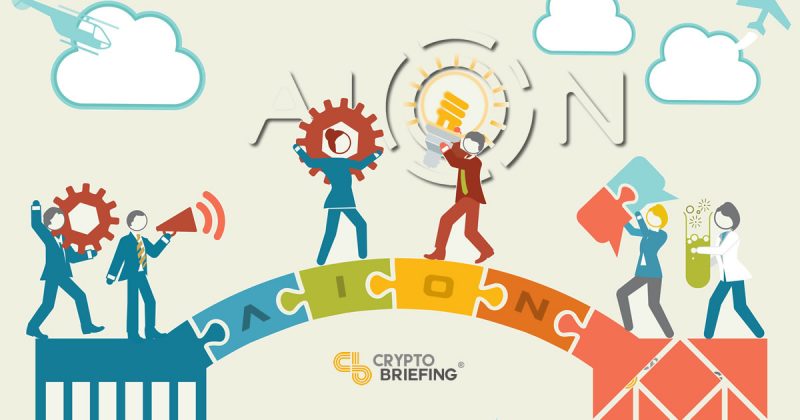
What Is Aion? Introduction to the Blockchain Interoperability Token
Aion is a Canadian blockchain hoping everyone in the industry can learn to work together. Is this the new blockchain-based Internet?
Aion, the cryptocurrency behind the “Open Application Network,” focuses on bridging the gap between other blockchains, acting as the fuel for these transactions.
The Canada-based OAN network is positioning AION for use in value and data exchanges, particularly for smart-contract networks like Ethereum and NEO. Similar to EOS or TRON, the coin uses a delegated proof-of-stake algorithm.
Use Case for Aion
Cryptocurrency is often promoted as a replacement for the world’s financial infrastructure. However, if this scenario comes true, it may create thousands of independent and isolated blockchains.
Communication and transfers between these networks is unlocking not only a banking replacement, but a replacement for the software infrastructure that currently runs finance.
The non-profit Aion Foundation wants to capture whatever markets it can with an open-ended system that connects to anything. Yet, it’s far from the only blockchain project attempting to accomplish this feat.
Even early networks like Bitcoin and Ethereum have interconnectivity projects in the works. For Aion to succeed, it’ll need a solid platform, world-class support, and enterprise partners with deep pockets.
To determine whether the Aion network has the chops necessary to accomplish its goals, let’s start with the performance of the AION token on the cryptocurrency market.
AION Cryptocurrency Summary
There is a total supply of 465,934,587 AION. Its peak price so far was $11.10, which occurred on January 9, 2018.
The Aion ICO token sale ended November 24, 2017 and raised approximately $20,000,0000 worth of ETH. At the time of the ICO, AION was an ERC-20 token on the Ethereum blockchain. The Aion blockchain mainnet launched April 25, 2018. It is nicknamed Kilimanjaro.
Aion has a bounty program that rewards community members for contributing technical support, documentation, and other assistance.
AION is currently mined using a modified Equihash Proof-of-Work mining algorithm. The Equihash algorithm was initially touted as ASIC-resistant, but Bitmain has since developed mining rigs. It seems that they aren’t currently being used for AION, though it’s unclear whether rigs ASIC rigs like Bitmain’s Z11 can be configured to handle Aion’s modifications.
When the Everest version of Aion is released, it will implement a DPoS-PoI hybrid consensus mechanism using Validators and Backers. Backers stake either AION or computing power to back Validators who distribute proportionate rewards upon validating a block. This model balances financial power with computing power to help democratize power over the network.
The token swap from AION ERC-20 tokens to native AION network coins happened from September 1 through November 30, 2018. The token swap used a Token Transfer bridge from Ethereum to partnering exchanges and wallets.
AION is accepted on a variety of cryptocurrency exchange markets, including Binance, BitForex, BCEx, DragonEX, CoinBene, and Bilaxy. Its trading pairs include BTC, USDT, and ETH. Over $4 million worth of AION is traded on a daily basis.
Official AION desktop wallets for MacOS, Windows, and Linux were made available mid-September.
Aion’s Nuts and Bolts
Aion’s founding team includes CEO Matthew Spoke, COO Ian Chan, and CTO Jinius Tu. The team was originally a company called Nuco that was working on a blockchain solution for Deloitte. It’s now run by the nonprofit Aion Foundation, while retaining much of the core team.
They each have a wealth of blockchain experience and noticed the issues of interoperability in blockchain early. They jumped on the opportunity.
The Aion network uses bridges to enable interchain transactions. Individual consensus is reached on each bridge using a definite consensus mechanism from the main chain. Validator nodes verifying these transactions earn mining and transaction rewards, which are then distributed among node backers.
Aion bridges can support both value and data, making it capable of value transfers (which work similar to wrapped ETH or USDT transactions) or data transfers. This is because the mainnet is a dual-layer blockchain running both a smart-contract layer and digital ledger layer.
With this framework, Aion is as scalable and efficient as blockchain 3.0 solutions like MOAC, HCash, and Ontology.
And Aion’s blockchain roots and interoperability goals brought it a lot of solid partnerships in the blockchain world.
Both Aion and ICON were integrated into CryptoCurve platform in October 2018. This move opens use of the Curve wallet for AION storage. CryptoCurve is the first to be launched through Wanchain’s WanLabs Initiative. Aion, ICON, and Wanchain are all members of the BIA.
BlockX Labs and Nodesmith are also supporting AION, and it’s only a matter of time before these partnerships and relationships grow.
Summary
Aion is a Canadian blockchain platform that enables interoperability between other blockchains using bridges. This interoperability is basically an expected standard feature with blockchain 3.0 projects, however, and it’s the founding team’s partnerships that will keep this project afloat. Aion’s success hinges on its ability to leverage these key ingredients:
- Aion’s mainnet launch in April 2018 and token swap through November 2018 proves a working product in an industry filled with vaporware.
- AION tokens are used to power crosschain transactions, whether of value or data. They’re mined using a hybrid DPoS and PoI consensus with a Byzantine Fault Tolerance.
- Aion is part of the Blockchain Interoperability Alliance, which is focused on building a sustainable industry and promoting connectivity between blockchain platforms.
With these pieces in place, Aion is part of the movement to replace the entire Internet as we know it with the blockchain. As more of these projects get implemented in the background, it will change the internet (although not in ways that are immediately obvious).
Time will tell what part Aion plays as this movement continues.
